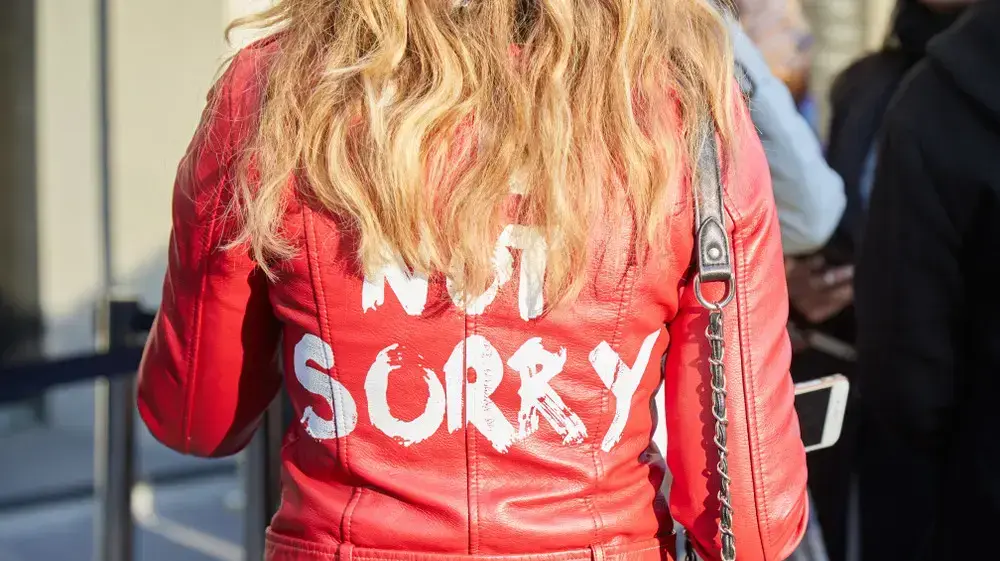Behavioral Sciences
Sorry not sorry: why did we stop asking for forgiveness?
On the face of it, people seem to throw "sorry" or "really sorry" very easily, but a deeper look shows that we have forgotten how to truly ask for forgiveness, from the heart.
Psychotherapist Or Yanir explains why this happens, and what it means for us
Or Yanir
04/10/2022
Tuesday, 04 October 2022, 07:27 Updated: 07:44
Share on Facebook
Share on WhatsApp
Share on Twitter
Share by email
Share in general
Comments
Comments
When did we forget how to truly ask for forgiveness?
A woman with a red leather jacket and the inscription sorry not sorry (Photo: ShutterStock)
It seems that in recent years the world has been busy apologizing and asking for forgiveness.
Figures from England show that the British say "sorry" eight times a day on average, with the overdoers doing it 20 times a day.
So it's true, Brits are (on the surface) an extremely polite people, and probably even if you step on their foot when you go up the wrong side of the escalator they'll be the ones to say sorry, but before you read to the end, try to think how many times a day the word comes out of your mouth "Sorry", in what situations and in what form.
The frequent and increasing use of the word sorry may make us think that we are really sorry and apologize more, but in fact the opposite is probably true, and there is a real gap between our language and our behavior and thinking.
one in mouth one in heart
There are 2 types of apologies.
You only use one
To understand this gap, one can think of a division into two types of apologies, depending on their authenticity and strategic nature: instrumental apologies that are mainly used by us and help us achieve a certain goal (such as avoiding punishment), and sincere apologies that reflect true remorse and acceptance of responsibility.
Between the two types there is a difference not only in the intention, but also in the spoken language and body language.
An instrumental apology is not one that reflects remorse, genuine admission of wrongdoing and acceptance of responsibility.
Instead, it is strategic and is used by us in order to achieve a certain result - avoiding conflict, avoiding punishment or avoiding rejection for example.
Behind it is a thought in the structure of "if - then" - "if I ask for forgiveness then I won't have to bear the consequences of my act".
The language we will use in such a case will be focused on the other side and not on us and the act itself, and will probably include the word "but".
The sentence itself will be something along the lines of "I'm sorry you feel that way, but...".
And in a four-word explanation: try to imagine a politician apologizing.
Apologies like that miss the point.
When we truly apologize, it's not to make ourselves look good, but to show and give the person standing in front of us the feeling that we see him, that we care about him and that his feelings are important to us, even if it makes us feel bad.
More in Walla!
This is what happens to you when you fail to forgive
To the full article
So why do we still use the same insincere apologies?
One possibility is that we just don't care and that we act automatically to get out of the way.
Another possibility is that we don't really believe it will change anything, but we are expected to do it.
Another possibility is that a genuine and honest apology is simply too difficult - we may worry that it will affect how we are perceived and that it will be seen as weakness.
In addition, admitting a mistake and accepting responsibility for it can damage our self-concept and trigger unpleasant feelings such as guilt, shame and anxiety.
Since we want to avoid those unpleasant feelings, but at the same time don't want to be perceived as heartless sociopaths, we find some twisted way in the middle and seem to apologize, but not really.
Sorry, not sorry.
The big trouble with apologies of this kind is that they are superficial and do not reflect remorse and a change in behavior.
I hurt you?
Okay, here's an apology and let's move on, until the next time exactly the same thing happens.
This is not what a real apology looks like.
A woman with an apologetic face (Photo: ShutterStock)
In front of these pointless and useless apologies, there are also other apologies - deep and sincere ones that reflect understanding, taking responsibility and a change in behavior.
Such apologies will differ in the language spoken and will be focused on the act itself and the feelings caused: "I'm sorry I did that" or "I see and understand that I caused pain and sorrow and I feel bad because of it."
Since a sincere apology not only validates the other party's feelings and emotions, but also expresses our own hard feelings due to taking responsibility, our body language will also be different.
When we express true regret, it will be harder for us to make eye contact, we will look down or to the sides more and in general we will take up less physical space in space.
The word "sorry" is derived from the word sorrow.
A sincere and genuine apology does not refer only to the sorrow caused to the other party, but also stems from the sorrow we feel ourselves and from regret for our actions.
Apologizing does not mean diminishing ourselves, being weak, or exempting the other party from any responsibility in a sweeping manner.
If we can leave for a moment the importance of our self-perception and allow ourselves a moment to be exposed and real, we can discover that an honest and real act has the ability to actually make us feel better, help a closer connection with the other party and even improve our self-perception.
So it might feel like we're apologizing more, but actually, it's a little less.
Suri, for real.
health
psychology
Tags
Sorry
apologies
apology
Yom Kippur
Yom Kippur












/cloudfront-eu-central-1.images.arcpublishing.com/prisa/S7ERVSCT4FUVX6R7TUVBDNTH5Y.jpg)


